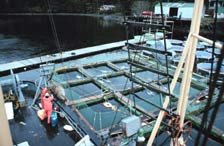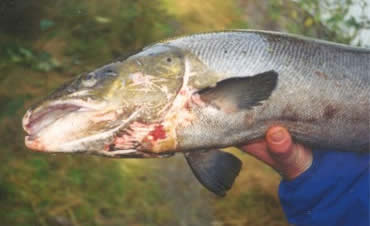In the last Eco-Logical, we reported the findings of much higher levels of cancer-causing PCBs in farm-raised salmon than in wild salmon. That's reason enough to think about changing your behavior as a consumer of salmon, but just in case you're not quite convinced, let's wade around a bit more in the murky depths of salmon farming. |

Net-pen salmon cages.
|
Beyond PCBs, farmed salmon contain higher levels of many other persistent chemical pollutants, including brominated compounds used as flame retardants and highly toxic pesticides such as DDT. Though PCBs are the most significant health concern related to farmed salmon, the other contaminants simply add to the overall concern about health risks associated with these fish.
Fish farmers feed their farmed salmon fishmeal made from ground-up sardines, anchovies, mackerel, and other small fish that larger wild fish would normally eat. This limits the food supply for wild salmon, other predator fish like tuna, and non-fish species such as dolphin, which are already suffering declines due to overfishing of the smaller species they normally eat. Though it seems like fish farming should have an overall positive effect towards saving wild fish populations, it does not.
It should be noted that salmon-farming researchers are experimenting with fish feeds made from vegetable sources, but this approach is not yet a significant part of salmon farming operations, and it would still leave some of the other problems with the operations to be solved.
The crowded conditions of a salmon farm often promote ill-health among the animals. Salmon farmers attempt to control diseases, parasites, and other problems by using antibiotics and pesticides.
According to the Coastal Alliance for Aquaculture Reform, farmed salmon are fed more antibiotics per pound of body weight than any other livestock animal in North America.
Much of the antibiotic dosages given to farmed salmon pass through the fish unabsorbed. The excreted drugs settle in sediments and other parts of the environment near the fish farm, where they impact many of the smaller life forms that are part of the complex local ecosystem. Such effects have not been well evaluated. Overuse of antibiotics also leads to more virulent, drug-resistant strains of bacteria.

Atlantic salmon with sores.
SOURCE: Alexandra Morton/Coastal Alliance for Aquaculture Reform
Salmon raised in farming operations located near wild salmon habitat can transfer diseases such as sea lice to the wild fish. Even though the nets don't allow the fish to intermingle, the free-swimming stage of the louse allows it to migrate from an infested farm area to nearby wild areas.
Fish feces builds up and pollutes the water and ocean floor in the area. Some salmon farmers also use anti-foulants on their net systems, and these chemicals—in addition to the pesticides and antibiotics—contaminate the water.
Although farmed salmon are penned, they often escape. Since 1988, the industry has reported that over one million farmed salmon have escaped into Pacific waters, and because it's likely that some escapes have gone unreported, some experts believe that the real number of escapees is much higher.
If genetically modified (GM) salmon escape, it could have very bad consequences for wild salmon stocks. Although GM farmed salmon are less fertile than wild salmon, they mature earlier, are larger and thus more attractive to females, and are more aggressive at fertilizing eggs. Overall, they outpace wild salmon at the reproduction game. However, because these GM salmon have a much higher mortality rate in the wild, their dominance of the reproductive process could ultimately lead to the demise and extinction of the species.
Egad! Mutant fish in the water and chemical-stuffed salmon on the dinner plate? What to do, what to do? The recommendations come in two flavors, one for us fish eaters and one for the fish farmers and regulators.
For fish eaters:
- Shopping: Stick with wild salmon whenever possible. Assume that unlabeled salmon is farm-raised. Don't be persuaded if your local fishmonger or grocery store fish manager tries to reassure you that farmed salmon is safe. Consider shopping elsewhere or choosing another fish. Use Environmental Defense's Seafood Selector to help you make wise choices.
- Dining: When in restaurants, ask if the salmon is wild. If it's not, consider making another choice.
- Overall: At minimum, if you do decide to eat farm-raised salmon at all, we advise following the recommendations from the Science study and eat it only once a month. Women who are pregnant (or thinking about getting so) should be extra cautious.

Pink salmon in British Columbia.
SOURCE: Alexandra Morton/Coastal Alliance for Aquaculture Reform
For farmers and regulators:
- Improved Feed Sources: The salmon farming industry needs to move to a feed mix that does not deplete global supplies of smaller fish and is lower in PCBs and other contaminants.
- Farmed-Wild Barrier: Growers must develop and use technologies and methods that eliminate transference of antibiotics, chemicals, and farm waste into nearby wild habitat.
- GM Salmon Ban: Genetically modified salmon should be banned since we know that salmon can and do escape into the wild and that escapes of GM salmon can have a negative, possibly disastrous, effect on wild salmon populations.
- PCB Health Guidelines: The FDA guidelines need to be brought into alignment with the more up-to-date EPA guidelines, which clearly show farmed salmon to be a human health risk.
- Testing: Official government testing of farmed salmon should occur as necessary to establish a new, definitive safe consumption limit for PCB-contaminated fish.
Sigh, things were so much simpler 20 years ago when we were in college. There was no "PCB salmon" at all—dinner out was usually just a trip to the lobby vending machine.
|


